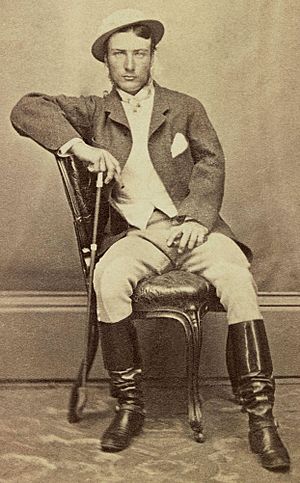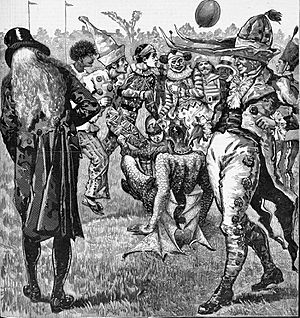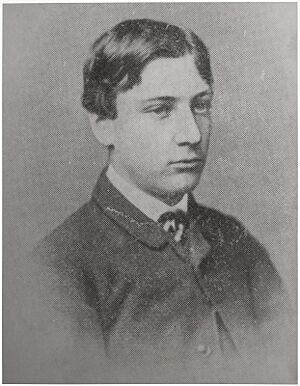Marcus Clarke facts for kids
Quick facts for kids
Marcus Clarke
|
|
|---|---|

Marcus Clarke, pictured in 1866
|
|
| Born |
Marcus Andrew Hislop Clarke
24 April 1846 Kensington, London, England
|
| Died | 2 August 1881 (aged 35) |
| Nationality | Australian |
| Occupation | Novelist, journalist, poet, editor, librarian and playwright |
|
Notable work
|
For the Term of His Natural Life (published 1874) |
| Awards | Fellow of the Royal Society of Arts |
Marcus Andrew Hislop Clarke (born April 24, 1846 – died August 2, 1881) was an Australian writer. He was born in England but moved to Australia. He was a novelist, journalist, poet, and playwright.
Clarke is most famous for his novel For the Term of His Natural Life. This book was published in 1874. It tells the story of the convict system in Australia. Many people think it is a classic book in Australian literature. This novel has been made into plays, movies, and even an opera.
Contents
Marcus Clarke's Early Life
Growing Up in London
Marcus Clarke was born in Kensington, London. He was the only son of William Hislop Clarke. His mother, Amelia Elizabeth Matthews Clarke, died when he was only four years old. Marcus had an uncle, Sir Andrew Clarke, who was a Governor of Western Australia.
Marcus had a shorter left arm. This meant he could not join the army. He also had a slight stammer his whole life. He went to Highgate School from 1858 to 1862. One of his classmates was the famous poet Gerard Manley Hopkins. Hopkins described Clarke as a very interesting person.
Marcus was known for being charming and witty. But he sometimes struggled with schoolwork. He loved reading novels.
Moving to Australia
In 1862, Marcus's father became very ill and died a year later. This left Marcus without money. When he was 17, his cousin, Andrew Clarke, suggested he move to Victoria, Australia. Another relative, James Langton Clarke, was a judge there.
Marcus arrived in Melbourne on June 6, 1863. At first, he worked at a bank. But he was not good at business. After a year, he moved to the countryside. He started learning about farming on a large farm near Glenorchy, Victoria.
Marcus Clarke's Writing Career
Becoming a Writer
Marcus Clarke started writing stories for the Australian Magazine. In 1867, he joined the staff of The Argus and The Australasian newspapers in Melbourne. He wrote columns called 'The Peripatetic Philosopher'. People enjoyed his humor, and he became a popular writer. He also wrote for the London Daily Telegraph.
In 1868, Clarke started the Yorick Club. This club was for important Australian writers. In 1869, he married an actress named Marian Dunn. They had six children together. Marcus wrote two comedies especially for Marian to perform. He also worked with poet Henry Kendall on a short magazine called Humbug.
His Most Famous Novel
In 1870, Clarke visited Tasmania. He wanted to see the places where convicts had lived. This helped him write about the convict period. His great novel, His Natural Life, started appearing in the Australasian Journal in monthly parts. It was later published as a book in 1874. The book's full title became For the Term of His Natural Life.
The story follows a young man named Rufus Dawes. He is sent to Australia as a convict for a crime he did not commit. The book shows how harsh and unfair the convict system was. It describes the terrible conditions the convicts faced. Clarke did a lot of research for the novel. He even visited the old penal settlement of Port Arthur.
Many people believe this novel truly shows what the Australian convict experience was like. It is considered a very important book.
Other Works and Challenges
Clarke also wrote other books, comedies, and plays. One of his plays was Twinkle, Twinkle, Little Star. Even though he was popular, Marcus Clarke often had money problems. He was forced to declare bankruptcy twice, in 1874 and 1881. In 1874, he had to sell his furniture and his large collection of books.
In 1872, Clarke got a job at the Melbourne Public Library. He became an assistant librarian in 1876. He did his job well, but he was known for being a bit playful. When he applied to be the chief librarian in 1881, he was not chosen. The library still has many of his papers, writings, and even his death mask and hat.
Clarke was a central figure in Melbourne's writing community. He was friends with many writers like Victor Daley and Henry Kendall. He died in Melbourne on August 2, 1881, at the age of 35. He had been very stressed and had health problems. He was buried in Melbourne General Cemetery.
Marcus Clarke's Legacy
Helping His Family
After Clarke's death, the theater community helped his family. They organized a special charity Australian rules football match. Actors dressed up in costumes from plays and operas. The match was held at the East Melbourne Cricket Ground. Nearly a thousand people came to watch. They raised money to help Clarke's family.

Lasting Recognition
In 1884, a book called 'Marcus Clarke Memorial Volume' was published. It included some of his most popular writings. It also had a story about his life.
For the Term of his Natural Life has been translated into many languages. These include Dutch, German, Russian, Swedish, and Chinese. It was also published in Britain and the United States.
In 1927, a newspaper poll in Melbourne named Clarke the top Australian novelist.
Marcus Clarke is remembered in several place names. A main street in Canberra City is named after him. There are also Marcus Road and Clarke Road in Dingley Village, Victoria, where he once had a holiday home.
In 1973, Australia Post honored him with a postage stamp. He also has a plaque on the Sydney Writers Walk. In 2017, he was added to The Australian Media Hall of Fame.
See also
 In Spanish: Marcus Clarke para niños
In Spanish: Marcus Clarke para niños
 | Sharif Bey |
 | Hale Woodruff |
 | Richmond Barthé |
 | Purvis Young |


